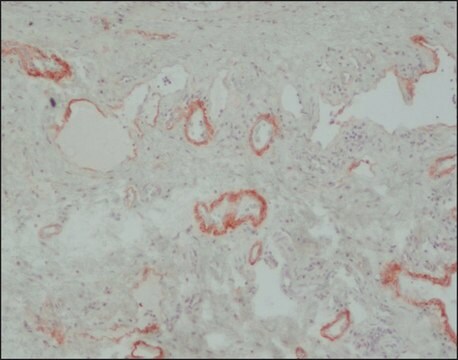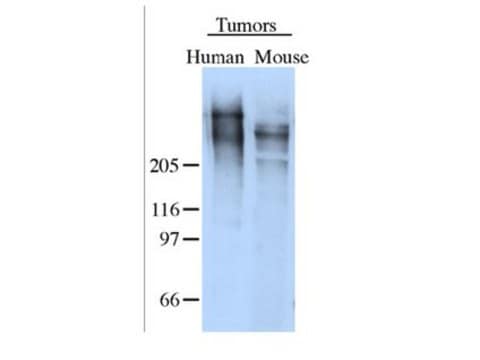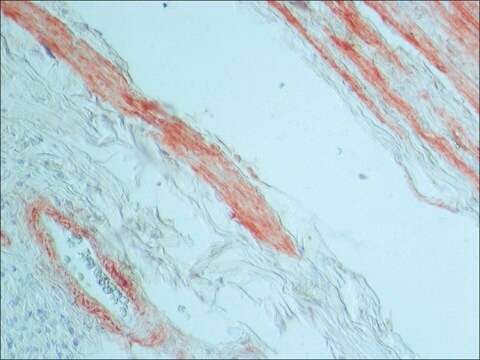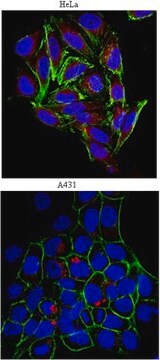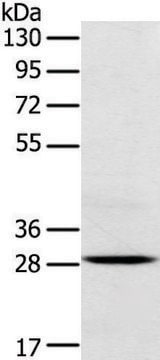すべての画像(1)
About This Item
結合体:
unconjugated
application:
ELISA (i)
IF
IHC (f)
IP
WB
IF
IHC (f)
IP
WB
クローン:
MTn-12, monoclonal
化学種の反応性:
mouse
citations:
26
テクニック:
immunohistochemistry (frozen sections): suitable
immunoprecipitation (IP): suitable
indirect ELISA: suitable
indirect immunofluorescence: 1:200 using unfixed, frozen tissue sections of mouse intestine
western blot: suitable
immunoprecipitation (IP): suitable
indirect ELISA: suitable
indirect immunofluorescence: 1:200 using unfixed, frozen tissue sections of mouse intestine
western blot: suitable
おすすめの製品
由来生物
rat
品質水準
結合体
unconjugated
抗体製品の状態
ascites fluid
抗体製品タイプ
primary antibodies
クローン
MTn-12, monoclonal
含みます
15 mM sodium azide
化学種の反応性
mouse
テクニック
immunohistochemistry (frozen sections): suitable
immunoprecipitation (IP): suitable
indirect ELISA: suitable
indirect immunofluorescence: 1:200 using unfixed, frozen tissue sections of mouse intestine
western blot: suitable
アイソタイプ
IgG1
UniProtアクセッション番号
輸送温度
dry ice
保管温度
−20°C
ターゲットの翻訳後修飾
unmodified
遺伝子情報
mouse ... Tnn(329278)
詳細
Monoclonal Anti-Mouse Tenascin (rat IgG1 isotype) is derived from the MTn-12 hybridoma1 produced by the fusion of rat myeloma cells and splenocytes from a Lou rat immunized with partially purified mouse tenascin. Human tenascin has three subunits of 190, 200 and 220 kDa. Tenascin has been independently discovered in a variety of species and tissue types, often in the basement membrane or intercellular spaces. It has been described under a variety of names: cytotactin, hexabrachion protein, J1, myotendinous antigen (MI) and glioma mesenchymal extracellular matrix (GMEM). The tenascin molecule is a disulfide-linked hexamer, depending on species, the molecular weights of the subunits range from 190 to 320 kDa.
Tenascin is a high molecular weight, multifunctional, extracellular matrix glycoprotein expressed in association with mesenchymal-epithelial interactions during development and in the neovasculature and stroma of undifferentiated tumors. It has been described under a variety of names: cytotactin, hexabrachion protein, J1, myotendinous antigen (MI) and glioma mesenchymal extracellular matrix (GMEM).
The tenascin molecule is a disulfide-linked hexamer; depending on species, the molecular weights of the subunits range from 190 to 320 kDa. In the mouse, two major subunits of tenascin with an apparent molecular weight of 210 and 260 kDa have been described. The shorter polypeptide predominates during earlier developmental stages and the larger polypeptide appears later in the embryonic gut and especially in the adult intestine. The expression of tenascin is associated with development and growth, both normal and pathological, whereas the distribution in normal adult tissue is restricted. It was proposed that actively growing, migrating and differentiating epithelial sheets can produce factors that can stimulate tenascin expression in the nearby mesenchyme. Human and chicken tenascin contain an RGD sequence which may function in cell adhesion and it seems likely that tenascin mediates cell attachment through an RGD dependent integrin receptor.
The tenascin molecule is a disulfide-linked hexamer; depending on species, the molecular weights of the subunits range from 190 to 320 kDa. In the mouse, two major subunits of tenascin with an apparent molecular weight of 210 and 260 kDa have been described. The shorter polypeptide predominates during earlier developmental stages and the larger polypeptide appears later in the embryonic gut and especially in the adult intestine. The expression of tenascin is associated with development and growth, both normal and pathological, whereas the distribution in normal adult tissue is restricted. It was proposed that actively growing, migrating and differentiating epithelial sheets can produce factors that can stimulate tenascin expression in the nearby mesenchyme. Human and chicken tenascin contain an RGD sequence which may function in cell adhesion and it seems likely that tenascin mediates cell attachment through an RGD dependent integrin receptor.
特異性
本抗体は、マウス線維芽細胞の培養上清および組織抽出液中のマウステネイシンを検出します。他動物種のテネイシンとは交差反応性のないことが観察されています。マウス腸の凍結組織切片による免疫組織化学によると、本抗体は絨毛の中心部には結合しますが、上皮細胞には結合しません。
免疫原
部分的に精製されたマウステネイシン。
アプリケーション
Applications in which this antibody has been used successfully, and the associated peer-reviewed papers, are given below.
Immunohistochemistry (1 paper)
Immunohistochemistry (1 paper)
Monoclonal Anti-Mouse Tenascin antibody may be used for the localization of tenascin and to study of the role of tenascin in epithelial-mesenchymal interactions using various immunochemical assays including ELISA, immunoblot, dot blot and immunohistology.
Monoclonal Anti-Tenascin antibody produced in rat has been used in:
- Enzyme linked immunosorbent assay (ELISA)
- Dot blot.
- Immunoblotting
- Fluorescence microscopy and immunostaining
- Immunofluorescence
- Immunohistochemistry
生物化学的/生理学的作用
Tenascin is a high molecular weight, multifunctional, extracellular matrix glycoprotein expressed in association with mesenchymal-epithelial interactions during development and in the neovasculature and stroma of undifferentiated tumors. The expression of tenascin is associated with development and growth, both normal and pathological, whereas the distribution in normal adult tissue is restricted. It was proposed that actively growing, migrating and differentiating epithelial sheets can produce factors that can stimulate tenascin expression in the nearby mesenchyme. Human and chicken tenascin contain an RGD sequence motif which may function in cell adhesion and may be recognized by integrin receptor.
免責事項
Unless otherwise stated in our catalog or other company documentation accompanying the product(s), our products are intended for research use only and are not to be used for any other purpose, which includes but is not limited to, unauthorized commercial uses, in vitro diagnostic uses, ex vivo or in vivo therapeutic uses or any type of consumption or application to humans or animals.
適切な製品が見つかりませんか。
製品選択ツール.をお試しください
保管分類コード
10 - Combustible liquids
WGK
nwg
引火点(°F)
Not applicable
引火点(℃)
Not applicable
適用法令
試験研究用途を考慮した関連法令を主に挙げております。化学物質以外については、一部の情報のみ提供しています。 製品を安全かつ合法的に使用することは、使用者の義務です。最新情報により修正される場合があります。WEBの反映には時間を要することがあるため、適宜SDSをご参照ください。
Jan Code
T3413-100UL:
T3413-BULK:
T3413-VAR:
T3413-.2ML:
最新バージョンのいずれかを選択してください:
試験成績書(COA)
Lot/Batch Number
The Expression and Possible Functions of Tenascin-W During Development and Disease
Tucker RP and Degen M
Frontiers in Cell and Developmental Biology, 7, 53-53 (2019)
Hox11 genes are required for regional patterning and integration of muscle, tendon and bone
Swinehart IT, et al.
Development, 140(22), 4574-4582 (2013)
Isabelle Louis et al.
Blood, 102(4), 1397-1404 (2003-04-19)
Oncostatin M (OM) transforms the lymph node (LN) into a "super lymphoid organ" with 2 striking features: massive thymus-independent T-cell development and major expansion of the memory T-cell pool. We report that T-cell development in the LckOM LN is regulated
Mazdak Bagherie-Lachidan et al.
Development (Cambridge, England), 142(15), 2564-2573 (2015-06-28)
Regulation of the balance between progenitor self-renewal and differentiation is crucial to development. In the mammalian kidney, reciprocal signalling between three lineages (stromal, mesenchymal and ureteric) ensures correct nephron progenitor self-renewal and differentiation. Loss of either the atypical cadherin FAT4
Site-specific HNK-1 epitope on alternatively spliced fibronectin type-III repeats in tenascin-C promotes neurite outgrowth of hippocampal neurons through contactin-1
Nakamura A, et al.
Testing, 14(1), e0210193-e0210193 (2019)
ライフサイエンス、有機合成、材料科学、クロマトグラフィー、分析など、あらゆる分野の研究に経験のあるメンバーがおります。.
製品に関するお問い合わせはこちら(テクニカルサービス)